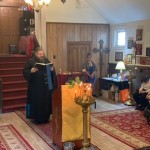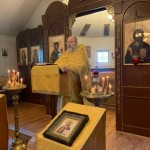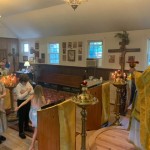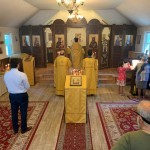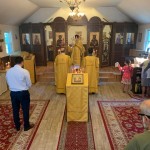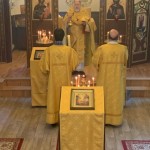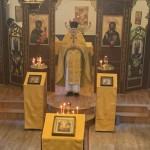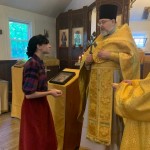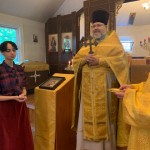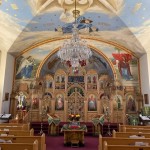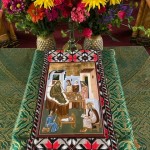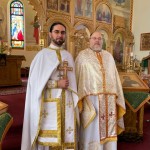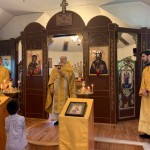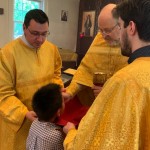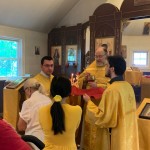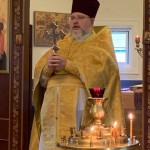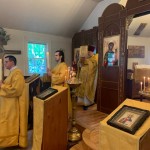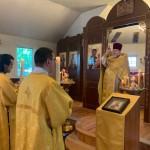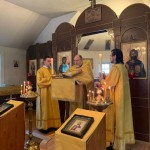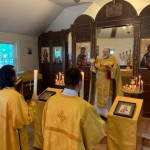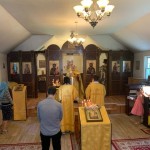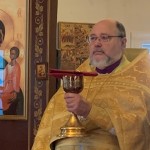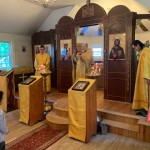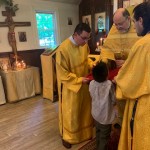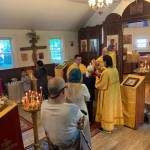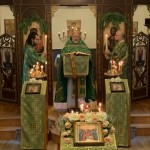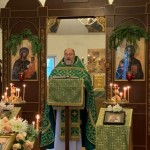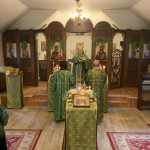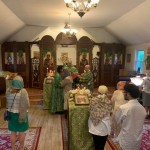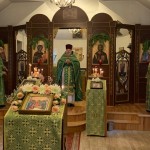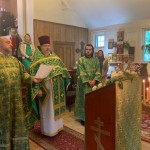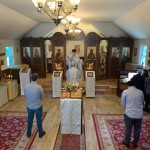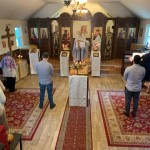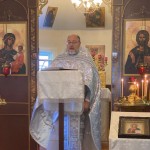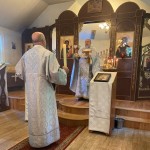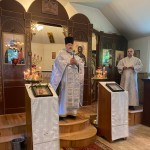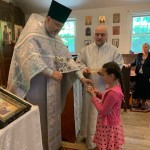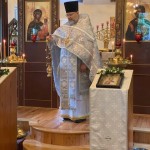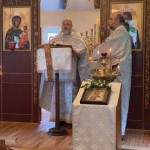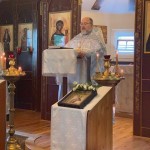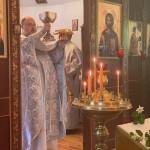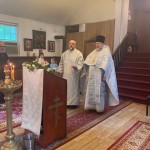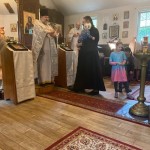On July 12, on the feast of the Holy Major Apostles Peter and Paul, the Rector of St. George Church, Archpriest Igor Tarasov served the Divine Liturgy in our parish temple. The service was attended by Deacon Matthew Keil along with his big family. Fr. Matthew read the 6th Hour and performed the reading of the Epistle at the Liturgy. After the readings from the Sacred Scripture our Rector preached the following homily:
“Today we celebrate feast of the Holy Major Apostles Peter and Paul. We finished St. Peter’s, or Apostolic fast, and now it is time to rejoice and celebrate the Apostolic feast”.
“Almost everything about those two men was different. They had different background, different level of education, different personalities. The ways they came to believe in Christ was also different. We may recall that Holy Apostle Peter was one of the twelve Disciples called by our Lord Jesus Christ to follow Him. St. Peter was one of the first-called. He left his fishing nets on the banks of the Sea of Galilee and followed Christ. He was with his Master almost until the end of Jesus’ mission. We know that Peter showed some weakness, got scared when Jesus was taken into custody. He renounced His Teacher three times. But we also know that later Jesus forgave His close Disciple and entrusted to him the care of the Church. Very different was the way of St. Paul. He was first the persecutor of Christians, an enemy of Christ, one of the zealous Pharisees wishing to destroy the Disciples of Jesus. Paul did not follow Christ while the Messiah was on the earth. He persecuted His Disciples after Jesus ascended into heaven. Yet Paul was made worthy to become a major Apostle. Being on his way to the city of Damascus Paul received a revelation from God. It completely changed his life. He turned into a zealous follower of Jesus whom he persecuted before. Paul became a hard laborer in the field of Christ, a fervent preacher of Christianity, an Apostle of the Gentiles”.
“As I said, almost everything was different about those two men. Yet one thing they had in common – their firm and profound faith in the Lord Jesus Christ. This faith made them holy, it made them capable of so many endeavors. That faith finally led both of them to the same purpose – to be with their beloved Teacher, Lord Jesus Christ. It made them die for Christ on the same day in the capital city of Rome, the very day we celebrate their memory today. This is why the Church does not separate those two holy men. We almost never honor them separately, for you do not hear about any Orthodox temple dedicated to St. Peter or St. Paul separately. Only in Rome where they both ministered and martyred, there are two different basilicas of St. Peter and of St. Paul (which are presently Catholic). And we know that there is St. Paul Cathedral in London (which is Protestant)”.
“Holy Scripture can tell us about the labors and endeavors of the Holy Apostles. Today’s Epistle lesson enumerates many works made, many tortures undergone and many dangers experienced by St. Paul (2 Cor. 11, 21-12, 9). St. Paul without praising himself, but very specifically describes that saying that compared to other Apostles he is “in labors more abundant, in stripes above measure, in prisons more frequently, in deaths often” (2 Cor. 11, 23). He then says that he will not boast in these heroic things. But he is trying to say that his true worthiness is that he was caught up to the third heaven, to paradise and “heard inexpressible words, which it is not lawful for a man to utter” (2 Cor. 12, 3)”.
“All labors, endeavors and sufferings of St. Paul, as well as of St. Peter and of all the Holy Apostles had one true and final purpose – to be caught up to heaven, to paradise and to rejoice in blessedness with their heavenly Teacher, Lord Jesus. Let us also, dear brothers and sisters, imitate the works and endeavors of the holy Disciples of Christ. We should also deem ourselves to be the disciples and followers of Jesus. Otherwise, what are we really doing here, in the church, why then we are called Orthodox Christians? This is why we are holding fast before their commemoration, to remember their hard labors and their sufferings for Christ. But sufferings end, and time of reward approaches. Thus, in the life of a Christian, time of tests and sufferings ends and the time of blessedness in heaven may begin. But to achieve that goal, we have to be the followers of Christ, the Apostles of our days. Let us then live, labor and die like Holy Apostles, like St. Peter and Paul!”
During the Litany of Fervent Supplication the Rector had a petition for the suffering country of Ukraine and its people. He also added a commemoration of the “suffering Ukrainian land” at the Great Entrance.
The choir nicely performed hymns in honor of St. Peter and Paul during preparation for Holy Communion.
Following the dismissal of the Liturgy the Rector and the altar servers performed the rite of glorification in the middle of the temple singing the troparion, kontakion and magnification of the Holy Major Apostles.

